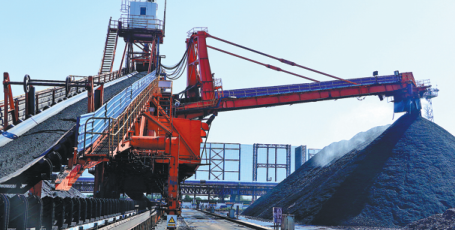Coal trade reaping the benefits of digitalization
Industrial digitalization is now a buzzword in Shanxi province's coal industry, as digital technologies are extensively used to improve businesses' operational efficiency.
When people talk about the burgeoning smart coal mines in the province, Zhang Ding, an executive for trading management at Taiyuan Coal Trading Center, knows that production is not the only sector benefiting from digitalization.
Trading of coal, as what his center has done since its launch in 2007, is also a major sector rapidly going digital and smart in recent years.
"Sales of coal are now quite different from those in the past, when deals were made offline and the entire process of inquiries and offers was very time-consuming," Zhang said.
He said the trading center was established to help to improve transaction efficiency for coal suppliers in Shanxi and buyers throughout the country. And the efficiency in transaction has improved with the use of emerging technologies such as the internet of things, big data, cloud computing and artificial intelligence.
Wang Pan, another executive at the center, cited an example to illustrate the center's high efficiency. On Jan 21, Chinese New Year's Eve, he received a request from a coal supplier in Changzhi city for coal sale.
The client was somewhat concerned with the timing of the request, as he anticipated most of the center's staff and clients' personnel should be on leave for Spring Festival.
Wang assured him the deal could be successful considering the big client base of the center's trading platform. As he expected, the transaction was completed in an hour.
From Jan 19-27, the center completed 78 transactions for 1.57 million metric tons of coal. The center's trading platform now has 24,629 member businesses throughout the country.
Jinneng Holding Group, a leading coal producer in Shanxi, is a member of Taiyuan Coal Trading Center.
Leveraging the center's platform, Jinneng has realized digitalization for transaction-related procedures such as purchases, sales, logistics, transportation and payment settlements.
It now has a unit dedicated to coal sales with a digital operational system that makes standardized management possible for inquiries, responding, pricing, order-based production planning, logistics, railway and port transportation coordination, according to the company's executives.
As an example, the group's coal deliveries to buyers across China and the world are made mainly through the railway linking Datong in Shanxi and Qinhuangdao in Hebei province, and then shipped from the seaport of Qinhuangdao.
Jinneng has an office in Qinhuangdao, responsible for the coordination of rail-sea transportation.
Shi Yanqing, chief of the office, begins his work every morning by checking delivery information through the digital operational system.
"We see the arrival of trains carrying our group's coal almost once an hour in Qinhuangdao," Shi said. "Despite this frequency, everything can be handled orderly, thanks to the system."
He said once he receives train departure information from Datong, he immediately informs the port logistics company in Qinhuangdao.
"The travel from Datong to Qinhuangdao is less than 20 hours, and this is a period long enough for the port to get personnel and equipment ready for unloading and loading," Shi said. "The system has allowed seamless connections among suppliers, transporters and buyers."
Zhang Yi contributed to this story.












